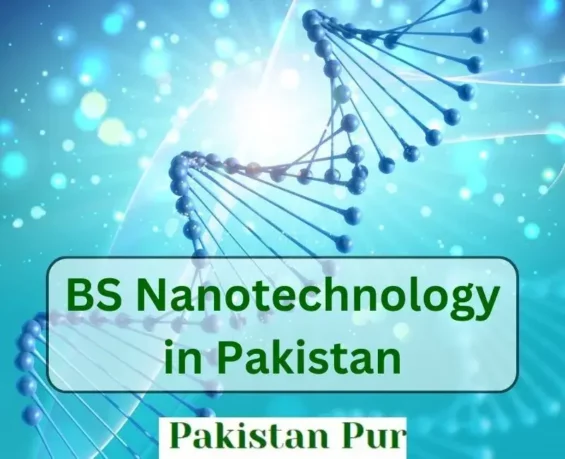
Table of Contents
Welcome to our comprehensive guide on pursuing a Bachelor of Science (BS) in Nanotechnology in Pakistan! Nanotechnology is a captivating field of science that focuses on manipulating and controlling matter at the atomic and molecular level. By merging principles from physics, chemistry, biology, and engineering, nanotechnology allows for the exploration and creation of innovative materials and systems with a wide range of potential applications.
This guide aims to provide you with valuable insights into the curriculum, engagement opportunities, and career prospects associated with a BS in Nanotechnology degree in Pakistan.
What is Nanotechnology?
“Nanotechnology is a field of science that focuses on manipulating and controlling matter at the atomic and molecular level.”
Nanotechnology is a multidisciplinary field that involves working with matter on an incredibly small scale – we’re talking about one billionth of a meter! In this realm, scientists and engineers are able to create new materials and products with unique properties and capabilities.
This Ultimate Guide to BS Software Engineering in Pakistan is a part on the series of articles on the best degrees after ICS. Read our full blog here.
Best Degrees after ICS in Pakistan
Importance and Applications of Nanotechnology
Nanotechnology, due to its ability to manipulate matter at an incredibly small scale, holds significant potential and has a profound impact in various fields. In the healthcare industry, it is revolutionizing diagnostics, drug delivery, and tissue regeneration. For instance, nanoparticles are being used to target cancer cells directly, reducing the side effects and improving the effectiveness of treatments.
Nanotechnology in Energy Sector
In the energy sector, nanotechnology is contributing to the development of more efficient and sustainable energy solutions. It is being used to enhance the efficiency of solar panels and fuel cells, and to develop energy storage technology like advanced batteries.
Nanotechnology in Electronics
In the field of electronics, nanotechnology promotes miniaturization, enabling the development of devices that are smaller yet more powerful. This is evident in the evolution of computing, where nanotechnology has played a key role in enhancing the performance of processors while reducing their size.
Environmental Conservation with Nanotechnology
Moreover, nanotechnology is also being applied in environmental conservation efforts, such as the development of nano-filters for water and air purification.
These applications represent just a fraction of the potential that nanotechnology holds, underlining its importance in driving scientific and technological advancement.
Read this guide to understand the scope of BS nanotechnology in Pakistan.
BS Nanotechnology Scope In Pakistan
BS Nanotechnology in Pakistan
Several universities in Pakistan offer a BS in Nanotechnology, including the National University of Sciences and Technology (NUST), COMSATS Institute of Information Technology, and the University of Punjab.
These programs typically span four years and provide a comprehensive understanding of nanotechnology principles, applications, and research methods.
List of Universities for BS Nanotechnology
Here is a list of universities in Pakistan that offer degrees or diplomas in Nanotechnology and allied fields.
- GIKI – Topi, Swabi, KPK: BS program in Materials Engineering, Specialization in Nanotechnology
- National University of Sciences & Technology (NUST): BS Metallurgy & Materials Engineering
- PINSAT- Preston University, Islamabad: Offers a BS degree in Nanoscience and Nanotechnology.
- Superior University: BS Nanoscience and Technology, Eligibility: FSc /A level or Equivalent with minimum 45% marks.
- Punjab University: Institute of Metallurgy & Materials Engineering, B.Sc (Engg.) Metallurgy & Materials Engineering.
Eligibility for Admission
To pursue a Bachelor of Science (BS) degree in Nanotechnology in Pakistan, students need to meet several eligibility criteria. Although the specific requirements may vary among universities, here are some general prerequisites:
- Educational Qualification: Candidates must have completed their FSc /A level or Equivalent, often with a focus on Physics, Chemistry, and Mathematics.
- Minimum Aggregate Score: Several universities require a minimum score in the intermediate examination. The Superior University, for example, requires a minimum of 45% marks. Some universities may require 60% marks.
- Subject-Specific Grades: Some universities may require a minimum grade in specific subjects.
Please check the specific admission requirements of the universities you’re interested in for the most accurate information.
BS Nanotechnology Courses
Universities offer tailored curricula for a Bachelor of Science degree in nanotechnology. Here, we present a comprehensive list of courses available at GIKI as part of their Bachelor’s program in Materials Engineering, with a specialized emphasis on nanotechnology.
This will give you valuable insights about the courses of BS Nanotechnology.
- Introduction To Engineering Materials
- Materials Lab-I
- Materials Thermodynamics
- Iron and Steel Production
- Evaluation Techniques and Instrumentation
- Phase Equilibria & Microstructures
- Crystallography & X-Ray Diffraction
- Crystallography & X-Ray Diffraction
- Materials Lab-II
- Materials Lab-III
- Alloy Production
- Foundry Engineering
- Non Ferrous Metallurgy
- Deformation & Fracture
- Manufacturing Processes
- Joining of Materials
- Engineering Design
- Nanomaterials
- Heat Treatment & Processing
- Heat Treatment & Processing
- Materials Lab-IV
- Materials Lab-V
- Corrosion and Protection
- Polymer Engineering
- Ceramics and Glasses
- Introduction to Mining
- Industrial Management
- Corporate Law
- Ferrous Alloy Production
- Casting Design
- Characterization of Materials
- Powder Metallurgy
- Advanced Manufacturing Processes
- CAD/CAM
- Introduction to Finite Element Methods
- Nanotechnology
- NanoCharacterization Techniques
- Nanotechnology in Energy
- Nanostructures and Devices
- Materials Lab-VI
- Materials Lab-VII
- Corrosion and Protection
- Surface Engineering
- Electronic & Magnetic Materials
- Nuclear Materials
- Composite Materials
- Advanced and Nanostructured Materials:
- Nanostructured Materials
- Biomaterials
- Automobile Engineering and Materials
- Application and Selection of Engineering Materials
- Design Standards and Quality Assurance
- Geological Engineering & Surveying
- Mineral Processing
- Extraction of Copper and Precious Metals
- Extraction and Gasification of Coal
- Mining Safety
- Mineral Evaluation and Petrography
- Accounting & Finance
- Total Quality Management
- Macro- and International Economics
- Entrepreneurship and Marketing
- Technology Management
- Lean Enterprise Management
- Supply Chain Planning

Frequently Asked Questions
Which degree is best for nanotechnology?
BS program in Materials Engineering, with a specialization in Nanotechnology, at Ghulam Ishaq Khan Institute of Engineering Sciences and Technology (GIKI) in Topi, Swabi, KPK. GIKI is one of Pakistan’s top engineering institutes, you’ll have access to world-class faculty, state-of-the-art facilities, and a robust curriculum.
Leave a Reply